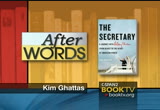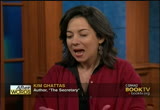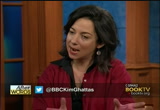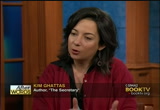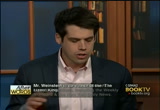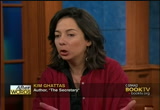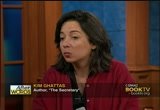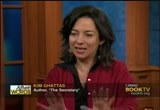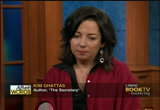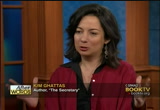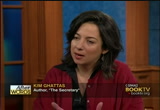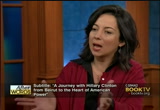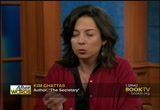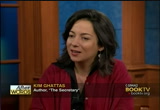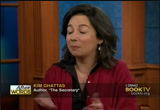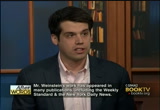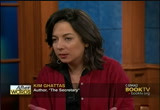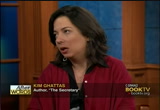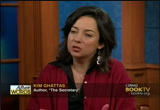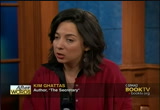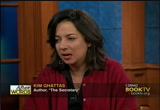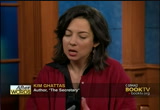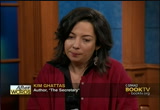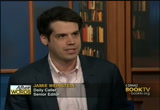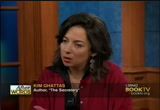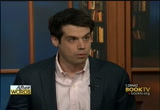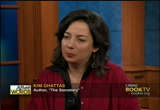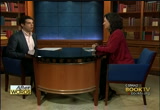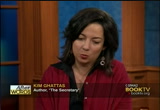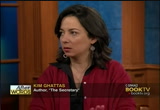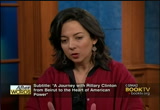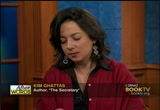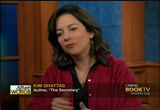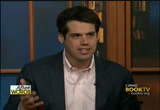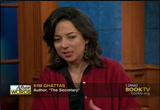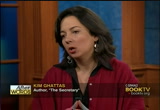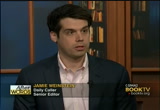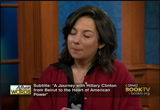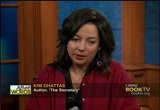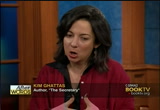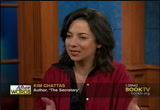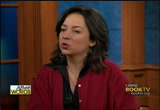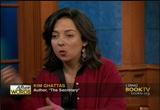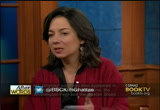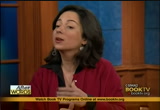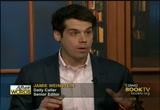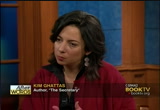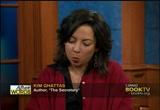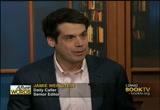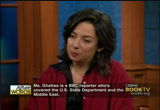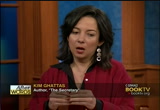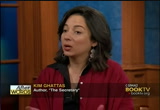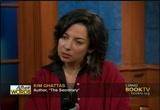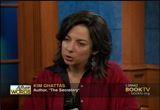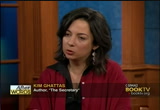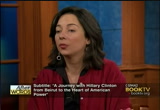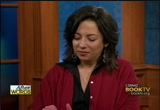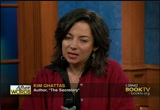tv Book TV After Words CSPAN March 24, 2013 12:00pm-1:00pm EDT
12:00 pm
12:01 pm
the program is about one hour. >> host: i think we should begin is to talk about your biography. as much as this book is about hillary clinton at a time the secretary of state, it's also about your experience from beirut, the sector of state around the world. so why don't you become a talking about where you came from. >> guest: thank you very much for having me. i'm delighted to be here and and a lot of by your first question. the biggest are in the book is hillary clinton herself. but this isn't just a biography of a historic woman. it's also a different take on the whole issue of american power. as you mentioned i come from beirut. i grew up there. i was born in beirut in the middle of the civil war in 1977. i did -- spit my whole life in
12:02 pm
lebanon. first 13 years in war and then the rest of the time that some people may know, beirut is not exactly this table country. so we've been through many, many ups and downs but i lived through all of them which gives you a very interesting take on the world come on america's position on the global stage. the first sentence of my book is i grew up in beirut on the frontlines of a civil war. and my father always said if america wants the conflict and it would be over tomorrow. it sort of frames the whole discussion about what is america, what can you do, how much power does it really have it and to try to find a balance between the solution of how much power america actually has and what is really happening on the ground. so that kind of brings the discussion. i lived in beirut my whole life. became a journalist there.
12:03 pm
living through war is what drove me to become a journalist. understand why i had to live through what it was living alongside the other 4 million lebanese who were there. i cover the middle east extensively, syria which enforces going to his own terrible conflict at the moment. saudi arabia, iraq and then i applied for a bbc job to cover the state to cover the state department of the to cover the state department to us over the course but in beirut that i was running for others as well, but i listen more and more for the bbc. i dimensionally -- eventual path is to determine job which was an amazing opportunity for me to see and other, another perspective on what i had been covering in the middle east. i knew lots about the use. i traveled there. i've been here in holiday. i have an american brother-in-law. a dj front row seat to the other side of the story. >> host: you are, if i'm not mistaken, the only non-american foreign correspondent and the
12:04 pm
traveling press corps, is that right? >> guest: that is correct. although my colleagues and want to point out that they are not american but i'm also nonwestern. i have a dutch mother, but for all intents and purposes o i'm very much an arab woman. i grew up there -- i lived there my whole life and that's kind of what i bring to the table. although i have a western perspective on some things because my background. my mother's nationality and the time i spent traveling in the west but yes, i was the only nonwestern and specifically for the bbc the first non-british person to cover this. >> host: one of the most interesting parts of the book is learning the process of being secretary of state going from country to country. you take us there as hillary clinton travel all around the world. let me just talk all of it about that. when the book opens, the push -- the first chapter.
12:05 pm
hillary clinton for the first time. you mentioned that the press is starstruck with a. do you think that affected the coverage in any way that she was such a big figure, that they were trying to hold back of a but? >> guest: i don't think so. there was this moment when someone with her celebrity status walks in to a room. it applies to world leaders as well. it's not just us a journalist. and, of course, just to reassure the viewers that there was no clapping because there was a lot of clapping when she walked into the building for the first day, her first day on the job. there was this instance of being a little starstruck because she is hillary clinton. not all of us had met her in the past. there is that first moment of wow, hillary clinton is there. but then it's followed by okay, what are the tough questions that we want to ask her?
12:06 pm
we didn't shy away from asking those questions throughout her tenure, both for myself when interviewed her. we had some very tough exchanges but also very clear and very much designed to broaden the conversation and further the understanding about the issues. and also there was wariness on both sides because she hadn't had necessarily to put it mildly a great relationship with the media. so she was a little wary of us, who was this new press corps that would cover, how were they going to write their stories? were wondering how is this going to work with this is both a political personality, whose son arrived in a very wonkish world of diplomacy were every, matters. how is this going to work? so it was also a certain degree of wariness when she arrived. she also brought with her a little bit of the hillary land as he was dubbed when she was at the white house. >> host: i was intrigued
12:07 pm
either fast pace of these trips. one day there in islamabad. the next day you're in the united arab emirates and you're constantly traveling. there's this book as you mentioned that's constantly updated with word they're going with information. there seems like there's little time to digest what you just did and when -- were you going next or even in this a point even in this of what i think you mentioned in one instance they're planning a trip to latin america in two weeks. is it good to be this fast paced but shouldn't it be more time to digest what's going on? isn't this how mistakes are made? >> guest: let me first thing about what it was like for me to follow through. it is very fast it is very fast-paced and, unfortunately, it's the nature the world that we live in. you don't have the luxury setback and press pause on world events and sake let me first digest what happened in syria before turn my attention to pakistan to its what i want to write the book. i'm a journalist covering daily news, weather, but with
12:08 pm
secretary of state are her heren washington where i cover foreign policy. that supported me to write "the secretary," to take a step back and digest everything i had seen. every i've learned. i learned a lot, being in this front row seat to history, to diplomacy. watching all those different events unfold. and writing the book was a very maturing experience as well as i digested as you say some of what i've seen come and try to come to some conclusions that i was trying to get at. but when it comes to the sickest and people around her, i think that what i found striking is her ability to stay focused at all times as much as possible on what is happening. she doesn't get distracted by the details if they're not important. details often met her but she has an ability to stay focused on the big picture. how is what's happening in
12:09 pm
afghanistan impacting what they might be doing in the middle east? how is the middle east impact you what to do in asia? i think she could sense of what is the big picture. what is the strategy? and, of course, she's around by people who are helping her. i had the tournament on cities but she has staff. that allows for an adult about that, that allows her to stay focused on what really matters. she doesn't have to worry about winter lunch will be served or when it arrives. she will have a while she's thinking about the bigger picture. but, of course, i think mistakes do happen but i think that's inevitable but it's also important acknowledge that. that's part of what motivated me to write the book your not just the audience in u.s. but around the world unless this impression that america is this all-knowing power that has the answers to everything, has all the facts and the foolproof plan for everything. it doesn't work like that.
12:10 pm
sometimes it doesn't work out. >> host: i want to explore that later because that's what is most interesting parts of the book is the question of america's role in the world. maybe we should turn to maybe some of the examples in some of the country to travel to. there's probably no better place to start than beirut. they traveled the early on and you did with the secretary of state. what was that like returning to beirut as part of an american delegation in the way you were part of the delegation because you were in the convoy, that used to watch and be a note of that when you're a child in beirut and growing up in beirut. what was that like? >> guest: it was very unsettling. writing that chapter was the first time i really said very much about -- it was the first time that i put into words how i felt about being there. as you mentioned, yes, growing up in beirut they were often
12:11 pm
mixed feelings about the united states, whether for me or others in lebanon. i grew up in an environment where we did tend to look to the west for support or help but i have a lot of friends who grew up on the other side of the divide who don't see the u.s. the way my friends or my family do. but it comes with sharp elbows sometimes and big motorcades. and big fortresses as indices. that can be a bit grating on the local population. so it was really interesting for perhaps revealing for me to be on the other side all of a sudden. it's a totally different person to which to look at the issue and look at the issue, to look at my own country. and i arrived. i'm in a convoy and i'm sitting there in the convoy and just a
12:12 pm
few cars ahead of me is another car. in the same motorcades surrounded by escort. there is the secretary of state and there's jeffrey spellman who is now secretary of state for the state department used to be ambassador to beirut. it was his convoy that used to people in beirut. they used to annoy me when i was stuck at an intersection waiting for him to drive through. and i think it's always worth remembering that you have to try to look at things from other people's perspectives, if you want to understand what they're going through. whether it's as a lebanese trying to understand what the u.s. is trying to do, or whether it's for americans like jeff feldman or hillary clinton to try to say what does it look like if you're in pakistan could what does it seem like if you're living in beirut? on some level it was quite
12:13 pm
emotional pick i read about how i landed in beirut and i call my sister and she says what does it mean for his? what is she going to? what's the plan? there's always this question what's the plan? and then there's this moment that assure with the sector because it's the first time she goes to beirut. she's never been to my country before. she knows that i'm lebanese and at a press conference she mentions that in public. i could just sor would imagine t people might have been thinking across lebanon. there might've been people cheering, she recognized my friend or colleague. we're so proud of her and thereby been people thinking, not exactly a badge of honor if the secretary of state recognize you in public like that. to which the conflicting emotions that come with suddenly finding yourself on the other side. >> host: did you get any calls from family members or friends asking you, kind of questioning you traveling with the delegation in anyway?
12:14 pm
>> guest: obviously there was a security issue with having to beirut. beirut has a very heavy history when it comes to its relationship with the united states, and i going to some details about that, you know, ambassador was killed in beirut, the cia chief was killed. the embassy was bombed. the marine barracks were bombed in 1983. so there are many reasons why the u.s. feels very wary about its security and the secret of its diplomats in the country. we were under instructions not to say anything to anyone about our arrival because we didn't want to compromise the secretary security. and our own. we are traveling with her in the motorcade. so wasn't able to tell anyone that was coming but the minute i landed i called my sister. my parents happen to be out of the country which was very disappointed, but my sister was there and i called her. clinton only spent four hours in
12:15 pm
beirut for the trip, but i stayed behind. so i stayed. everybody comes up to me and i have lunch and breakfast ended with friends and it's very social environment in beirut. it's all about eating out with people. everybody is asking, so what argument can stick about his? what are they doing about that? what does it mean? what is she going to do? those are the questions i used to ask myself about the united states when i was in beirut, it was fastening for me to try to answer some of those questioned with whatever is that i did know. >> host: one of the issues that always occupies any secretary of state, any administration, usually of the input in this case the beginning of the israeli-palestinian conflict, israeli-arab conflict. president obama his first call was to present mahmoud abbas, the head of the palestinian authority. how did i get t derailed? it seems like it's no longer
12:16 pm
maybe again become a front burner issue but for at least three years of the presidency, went to the back burner. what happened? >> guest: several things. it certainly wasn't from lack of trying on the part of this administration. you can sum it up by saying expectations were raised way do i buy the president. by the administration. there was a belief that perhaps there was the winner of opportunity that could be used to advance the talks, but there was initiating in the united states about what has changed on the ground in israel and in the palestinian territories, and were each of the player was, netanyahu and mahmoud abbas. there is also the sense that a few the american president you can make anything move, and then you go against reality. it's not enough to be the candidate of change, the president of change.
12:17 pm
there is certainly out on the ground. sometimes the person of a president can help make things move along. but you have to remember that players on the ground have their own agendas, their own domestic considerations. their own fears and concerns about what they can give up on or not give up on. then there was this moment where hillary clinton showed her loyalty to the president. and without too much to the readers about the flaws, there's this moment where she shows loyalty and enterprises statement that the president has made, and a way that the players on the ground, the palestinians and israelis, feel they are now stuck in a certain position and they have to block that. of the palestinians are sitting there thinking, we're not going to be more british than the bridge or more one of my routine. we wait for the americans to deliver what they said they would deliver. >> host: we are talking i think about the settlements
12:18 pm
year, the administers position was freezing settlements which was beyond what the palestinians were actually calling for at the time to negotiate. >> guest: and beyond what the israelis were willing to give. >> host: once the present me that the issue, the palestinians basically left. but that was an example but it was interesting because it was an example where think is a hillary clinton disagreed with the president. >> guest: but she didn't say. as far as i could tell she didn't voice that disagreement at least not forcefully. she picked up on the fights within the white house. it was all about being bullish. is all about showing netanyahu who was the boss. because remember, her husband, bill clinton, was in power in the 19 -- went resident benjamin netanyahu was premised. there was a lot of frustration and i described a little bit to explain the context with which come within which people were operating. hillary clinton is in weight in
12:19 pm
the back and she was and the policymaking aspect of the white house back in the '90s, but she remembers what the interactions were like. rahm emanuel is back. he was a by bill clinton's site. not devising policy on the middle east but certainly an adviser. and now he is there with president obama and it sort of informed a little bit of the mood of needing to be bullish and needing to be strong when it comes to dealing with benjamin netanyahu, because everybody who's been there before. and i had american officials tell me benjamin netanyahu thinks he can wait this out until we leave, but we're going to be here longer than him. so we can try to move the ball forward all of it here and there until he's edged out of the political scene because that's just the nature of politics in issue. but benjamin netanyahu has just been reelected. there were a series of miscalculations, but i think that what i would like to remind
12:20 pm
people o of his that there is a tendency in the arab world, and possibly around the world, to always say americans did this wrong. it's america's fault. america didn't deliver. to some extent there is truth to that but i think that it's also for for people in the region, for people like me, for people in the arab world to come to grips with the own responsibility about what they can do. very difficult for the palestinians to feel like they have the upper hand because they are certainly in a very difficult position and they are not the strong as part of the negotiating table. but it doesn't help the issue to just blame everything on the united states, and that's something that is ingrained in a lot of people's thinking. >> host: i think it's a jumping off point, this disagreement between the president and hillary clinton
12:21 pm
how to approach the conflict. to ask you, ask you were there lots of discrete you could tell between the president and the secretary of state and how to approach adverse situations around the world? what was really her role as trent? trent-- secretary of state? what she and fo the many policy from the white house traffic let's go back to the israeli dusting to discussion. i think she didn't necessarily voice or disagreement about the approach the message was taken because it's in the first year of her tenure. all she wanted was to show loyalty. that is something my reading of what was happening. so she may have thought i don't think this is the right way to go about this, but she didn't voice that very forcefully. i'm not sure that was an open disagreement. that is an interesting aspect of the relationship between hillary clinton and barack obama, to formal rivals who are learning to work together now as president and secretary of
12:22 pm
state. but overall in the bigger picture, i think that she did carry a lot of weight when it came to the decision-making. i think she was both an influencer and an implementer. she was one of the heavyweights at the table alongside bob gates in the first cabinet, or in the first term of president obama. she had a lot of experience. she was a big player on the global stage. president obama knew when he was elected that he wasn't going to be able to go around the world and make america's case on the same basis because he would be busy at home with economy. it was a clear reason and one of the many reasons why he chose her as suggested it because he knew she could do that for him on a daily basis in all, around the world. that's what i think that she would bring to him and accurate reading of where things stood. what she could deliver to him in
12:23 pm
terms of moving forward, where the players were when it comes to libya, for example. deliver to him what was needed for him to make the decision. she lost some battles but she certainly influenced a lot of decisions. libya being one of them. and asia definitely. >> host: we would get to libya next. it was a very interesting scenario in what happened there. but just one last question on the israeli-palestinian conflict. i was covering aipac 210100 clinton spoke at the conference. she mentioned at the time something that i thought was interesting. she said that far-flung destinations in the conflict where she would be traveling, that issued its took him up as the first, second or third issue. it struck me as unlikely, other than europe, that people would be focusing on this far-flung destinations, and once was a wikileaks come out and we saw that the saudis went in that
12:24 pm
particular interested. they wanted to talk about iran. did you get the sense that beyond maybe israel's immediate neighbors and beyond maybe europe that that was one of the top issues of discussion that people wanted to talk to hillary clinton about? >> guest: it comes up often, and beyond those reasons. but if you're in pakistan, there are immediate concerns that pakistan has. but america's relationship with israel has often come to the floor as the way for people in pakistan or afghanistan to explain what america's prison is when it deals with international affairs. i think that it's a conflict that grabbed a lot of headlines. it's ongoing. it does resonate around the world, all the way down to africa and latin america. because it is what i it is conflicts that is constantly in the headlines. i'm not sure whether every
12:25 pm
single world later she met with wanted to speak about the arab-israeli conflict but i have no doubt that it cam came up vey often. >> host: it just struck me as one of the things that might have led us to try to dress the conflict, believing it was linked to so many other things, but we move on to the arab spring as it showed other things are going on that are not necessary focus on the israeli-palestinian conflict. arab spring dominated a lot of time of sector estate. it happens on but no one was anticipating it happening, at least at that moment may be to believe that down the road stability would not be maintained. what was it like to be covering the state department at the time of the arab spring, and how was the state department handling all these things happening at once? >> guest: they were crumbling -- scrimmage to keep up with the change. i think everybody was. the europeans, the russians, the
12:26 pm
chinese perhaps to a lesser extent. much further way to have the own domestic concerns. it was again going back to the point i was making at the beginning. it was reminder that the power is run by fallible human beings, real people who are thinking oh, my goodness, what is going on, what are we going to do, what are the long-term consequences compassion we had of this? what about mubarak? what happens? what happens of relationship with other countries in the region? the u.s. is often seen as a fickle friend. if we summon tell mubarak he has to step down, one of the saudis going to think? one of the pakistanis going to think? it was just a reminder of that, but i think the arab spring, the chapters around the arab spring are a perfect example of what this book is trying to do. it's trying to bring the reader into, or give the reader a front seat row to diplomacy in action.
12:27 pm
it's a great way to travel around the world, sitting in your chair, getting a history lesson on international affairs, and learning how to connect the dots, learning how one crisis affects another, another region. how what happens in far-flung areas actually affects people in the united states. and trying to do in a very accessible way that makes it engaging for people thinking in the florida or oregon or not quite sure why they should care about the arab world drama it's an interesting topic, jumping off point for the discussion of american power. for all this talk of american decline, you write in the book that no matter how maybe some people in the region didn't see america as always a benevolent force, in the midst of the storm for these revolution, no one was calling out to china for recognition. they were still going out for america in some way or another
12:28 pm
trip to the are. and when america doesn't respond people get upset. more so than if china doesn't respond. there's still a feeling within the arab world and other regions i think as well. that no matter the fall, the u.s. should stand up for democracy, human rights, et cetera. so whatever the history of the united states, what are the interests that has to pursue, that is the expectation. >> host: but you write it's almost like a catch-22. quote one official who says if we intervene, they say we are meddling. if we stay back basic why are just an effort human rights? so no matter what we do we are in some kind of criticism. >> guest: that is the fate of the superpower. it is a catch-22. people want you to deliver for them, but they don't necessary want to give you what it takes to deliver for others. so it's all about your own
12:29 pm
interest. i do quote this official who says we're damned if we do, damned if we don't. the pendulum swings constantly. it's a cyclical thing. look at cedar is now. people are very, very upset in three. and in the region. and here in the us. to look at senator john mccain, very upset u.s. isn't doing something. that was perhaps as much upset when he is decided go to war in iraq. not as upset because of an action and under the bush initiative that was upset because of action. it's a struggle to find that fine line. >> host: i think it's break time. >> "after words" is available through podcasts. click podcast on the upper left side of the page. select which podcast you would
12:30 pm
like to download and listen to "after words" while you travel. >> host: and then there was libya. which could argue be a success, some people say a distraction or whatnot, but certainly hillary clinton played little role. she traveled to france as you document in your book, and she basically wants to make sure the other people are going to contribute before -- doesn't seem like she's giving hands that the obama initiation is going to act but she wants to first make sure other people will act with the united states if there is action. so explain what she's doing in france. >> guest: let me to the context of the trip because it was one of the most incentives that i have been on. everything was on the move. it felt like the world was ending. you had the earthquake in japan with economic their.
12:31 pm
you had a crisis with pakistan where a contractor was detained. you had the revolution that was just ending in egypt, hosni mubarak had just stepped down. tunisia had already happened. the revolution was ongoing. syria was just directing, and you had a couple thousand saudi and iraqi troops filing into, marching into bahrain to try to quell -- well the fighting there. the u.s. is coming under intense pressure to try to do something about libya. where moammar gadhafi was threatening to level the city of benghazi. so that takes you back to one of the first questions that you asked about, yeah, it's all
12:32 pm
fast-moving and how to make sure that you are not making any mistakes but you don't have the luxury to stop. you have to handle it all at the same time. that's one tiny little window into how dynamic it is to address all those challenges. so hillary clinton goes to paris to try to assess what everybody is on the issue of libya. because this administration is not going to get involved in any sort of military intervention unilaterally. there is no repeat of that for this administration. and they don't want to be leading the charge and then find out that everybody is standing way back in the back, criticizing them for having gone forward. so they're keeping their cards very close to their chest. and hillary clinton is in essence kind of lining up her ducks, or as i said i in the bo, go to her checklist. what do we need, what does the u.s. need to make the decision
12:33 pm
to go for intervention? and she goes about very methodically lining all that a. she speaks to the brits and french forgot exactly what they're going to continue or not if they understand what it entails. she explains a no-fly zone is not actually enough, we need to do more. the arab league has just called for a no-fly zone, so they are on board. that kind of moves the needle on the decision-making for the united states here crucial he she meets with the libyan opposition leader to kind of size of who is this meant and what can he bring, what will he deliver, who are we doing business with? it's when she gathers all those elements that she makes the call and decide it's time to tip the balance in favor of intervention. that's very often how she operates, as far as i could tell in conversations with the president. she gathers everything she needs to make her case, and then she
12:34 pm
does it by making that case to the president and in essence almost leading into the natural conclusion of what is the next step to take. >> host: i think within this can we see as this official told ryan of "the new yorker" this is leading from behind. traditionally would imagine america would make a decision this is in america's natural answer to will gather a coalition and we will compel people argue people to join us. if they don't join us we think this is in our interest, we're going to do. but what we see through your example is she is first trying to make sure people are going to do something. if they're going to do something then we will consider doing it. she's not saying that this is what we need to do, this is in america's natural interest. she's waiting for other people to commit to the united states before doing a. i see this in a real way a different way than we've seen in the past administrations in america acting. >> guest: it's not that
12:35 pm
different from the coalition put together by bush senior for the first gulf war. that was also a collaborative effort. the united states was leaving perhaps more openly and vocally but certainly wants to make sure that everybody was on board and they wanted a broad coalition. and what hillary clinton president obama do with libya, it's not really in our national interest to get involved in this, but it matters to our european partners. and the arab world is asking us to help them in a way that sounds as though they're willing to put their money where the mouth is. because she also talks to the m. arise and others and ascertained that they will participate military. that's often the danger. the united states and leads the charge. the arabs don't participate militarily. and they criticize the u.s. for getting into war and another
12:36 pm
muslim country. it was not making sure that the perception of what was happening was accurate. they want to call the leading from behind? it's certainly not leading from the front but i'm not sure it's the right character session. i think it's a more collaborative approach to how you exercise american leadership and how you bring people on board. >> host: that the u.s. would not have -- you think united states would've gone into libya had friends and the arab league not been pushing for it and promising? >> guest: possibly not. because the french were adamant that they wanted to go ahead with it. and i think that was part of, one of the factors that shaped the conversation when people were debating this within the administration. clinton tells the president look, the french are going ahead with this, with us or without us, and we may just as we'll get in there and she does look like
12:37 pm
something that we can work with. there's no point in having just a no-fly zone if we're going to be doing a no-fly zone for 10 years. what's the point? you need to actually have a result. and that's where the discussion comes in about including the word all measures to protect civilians. that's the final resolution that gets voted on at the u.n., as we are flying back from the region, back to the u.s. on that trip that we were discussing, we went to paris. we went to paris, egypt and into this. it's in the course of those four days that that decision is made. so the conversation was very much, the french are going to go ahead. we can let them do whatever they want or we can try to shape us into something that is going to deliver. >> host: i think my favorite chapter in the book is the trip to burma, perhaps because it might be the most historical. >> guest: i love that chapter. >> host: just talk about what made that trip so unique.
12:38 pm
obvious that not very many people have gone to burma. >> guest: more and more of a string of the time it was very novel. you know, it was a very special moment, and it goes back to when you look at the big picture of what, no, my book will do for readers. is this is a book that is several things. it is, you know, my personal story, my perspective on american power. it is the story of hillary clinton as secretary of state and our approach to the american leadership and the concept of smart power which we can talk about later, how do you do business as a global leader in a challenging world. but it's also a portrait of the woman. this historic figure in the united states politician, like her, whether you like her or whether you don't like her, she
12:39 pm
has a global stature. she is a celebrity. she's a big personnel. she's been in the public eye for several decades. by think that readers will discover things about her that they didn't know and see her in a different light. and i think that chapter in burma achieves part of that as well, where you see her as a woman whose meeting another historic figure, the nobel peace laureate, to an amazing women, both for very different reasons to come face to face can have never met before, and it's quite emotional and very historic because of who these two women are. and in a way, again, what if you think of hillary clinton i think everybody can agree on the fact that she is a global figure with an important stature on the global stage. she probably rarely meets women
12:40 pm
or people in general who are on the same historic level as hers. and i write in the book about how it's almost this moment of recognition. and four aung san suu kyi every as welcome as the everyday she has a opportunity because she's been under house arrest in burma for so long as jesse opportunity to meet world figures like that. so it was that moment that made the trip very special and that's why i agree with you, it's a great chapter but it's also to see american diplomacy in action and to see a tangible, if you want to use a walker's word deliverable, there aren't many deliverables in this day and age of diplomacy. but the opening up of burma, still ongoing, no guarantees of long-term success but they seem to be on on the right, going in the right direction.
12:41 pm
that was quite special to watch as well. and it was done again very collaboratively. the united states and working on partners in the region, to make this moment happened. >> host: when you said you landed in burma, and traveled around, don't time the reporters were actually outside the window, not because it was unique and interesting, which it probably was, but because there was no black area service guess that we're still addicted to our blackberries. sometimes we miss looking around you. you don't have time because you are filing, you are filing a story. talking to your editors what they need. for some people checking back home with their families. is everything okay? i'll be home or not, for my birthday. my daughter's birthday, et cetera. so you tend to be hunched down on your laptop or looking at your blackberry. but in burma, communications was
12:42 pm
very limited. internet was very limited in the country. it's not north korea, but it's quite close, or it has been for the last few decades. so was a great opportunity for us to just sit back and actually look at the beautiful scenery and taking what was unfolding in front of us host let's take on the broad element of the book that you discuss a little bit, but let's tackle it head on. i think as we said, this book is really the expiration -- exploration of many powers and will, questions of american decline, is it happening, is it not? is it a good thing if it was happening? is it not? what is your conclusion to those really big questions? >> guest: in some ways i'm hoping my readers will draw their own conclusions when they read all those different chapters, all those different angles, all those nuances. the book is like cliff notes for
12:43 pm
international diplomacy, international affairs course if you will. done in a fun, engaging, very colorful way with a lot of tasty at the people remark on the fact they were exhausted just reading the book because they got this phonetic aspect to it. i think that what i gain from writing this book was a greater understanding of what it is like to be a superpower. it seems easy, but it isn't. i've had the turkish foreign minister said to the -- say that to me as a. it seems easy come you can do whatever you want. it doesn't work like that. it's important to acknowledge that, to recognize and see how you can behave in accordance to that, whether you're american or whether you're overseas. i found that in my research, i knew on this sort of, i sort of
12:44 pm
went into the intellectual aspect of it, i knew that the conversation about american decline was cyclical. because the headlines about american decline where their costly when i was growing up in beirut, particularly after the bombing of the marine barracks. america in retreat, american decline, a close to america, they could blow to american credibility. america is over. that's it, it's done. 20, 30 years later, america is still there in one way or another. the conversation is back, does america have force in the middle east? it ends and flows depending on what else is going on. but i think no one can dispute the fact that america is no longer the sole superpower. it has rivals. it has allies who want more of the same. it has friends like turkey who are rising and want to have a bigger say on the table. what i found interesting was, clinton's approach to that, and
12:45 pm
some extent it's the president's vision as well of course. don't try to suppress that but work with. how can you turn this to your advantage? how can you work with turkey to bring them on board and work toward a common goal? you know, it sounds great and easy. it's not that easy but i think that clinton, her advisers, i mentioned jake sullivan who was a deputy chief of staff and is just been appointed to work as national security advisor for the vice president, and then people around the president as well, they saw smart power collaborative approach to power as a more realistic, long-term strategy for maintaining global leadership for the united states. now, if you don't want american leadership where ever you're sitting somewhere in the world, if you resent american power, then that's something that you have to learn to work with as
12:46 pm
well, of course. but i think that as clinton told me in one of the many interviews, and i interviewed her 19 times and she sat down with me before the book as well, it doesn't work anymore to say you are with us or you're against us. the united states is in a position anymore. if only because of the economics. this is an unrivaled economic superpower anymore and it does have the money to throw around to get done what it wants don. >> host: i thought in the book you coming to terms of asking questions about some people will might want american decline but what does that mean, do you want china to replace america? would that be good for the world? or no power of the world? would that be -- i took away the impression that in some ways very personal terms because it's not only this broad question of american power, it's relating it to your experience back in beirut and what you learned from the secretary of state that you
12:47 pm
think america having a strong presence in the world, the strongest presence in the world even if you think it's relatively decline. administrating that? the relative decline think i think american power is to change. i think the whole notion of power is changing pixel are not a big fan of the word declined to because i don't think it reflects this is on the reality. i'm not a policymaker. but from where i'm coming from as a journalist, someone who has lived if you will on the receiving end of decisions made in washington, i'm not sure that the word declined is the right one but it is certainly the one used in the debate. i think that what i found was that there was no one else who could take on the role at the moment. practically speaking, that the u.s. has. china isn't ready to take on the role of invisible power. and i also discuss how having no
12:48 pm
one superpower, or no leading superpower can lead to global gridlock. there have been many books written about how, if you don't have one meaningful power it leads to this g0 world, a phrase coined by ian brimmer. look at syria now. because the u.s. is unsure what to do, no one is really quite doing anything. they're doing a little bit of this. they're arming, the turks want to do this. coming in and taking charge. that's what happens when you states doesn't put its foot down sometimes and say this is what we should do. but i think that's the way they've been approach that and how to move forward, requires the united states to do it as i've been thinking a more collaborative way, to get people on board rather than lectured in and bully them into doing
12:49 pm
something. we may be wrong. and a few years we will see the world changed again. i'm not sure i don't have a crystal ball. but shortly after moment it looks like, it does still require american leadership, even it's a caching even if it's collaborative to get something done than one people saw on the ground, look to america and to talk about a trip to the route you took in the summer of 2011 in the midst of the arab spring. in some cases get our revenge opposed in egypt. and your two friends, not just won't go to france -- >> guest: i have several. >> host: asking basically, this was are castrated by america. they want to get rid of dictator, what is aplenty think with lebanon? they couldn't imagine a superpower like america wasn't really pulling the strings. >> guest: it was an interesting moment that i found
12:50 pm
very revealing of the continued perception of america as a master puppeteer holding all the strings. but it was an inherent contradiction in what my friends were saying or other people in the region, where simultaneously they were praising people power which had brought down mubarak which had brought down the market of the, brought down -- and at the same time they're convinced the united states is pulling all the strings. and i don't know how you can have the images. my explanation is that when chaos erupts around you, you want to find a neat, tidy explanation for a while. you don't have any control. that is certainly what my experience was like growing up in lebanon. there was war and i can't do anything about it, there must be someone responsible. and beyond the militia leaders
12:51 pm
in my country, somebody must be pulling the strings somewhere. it must be america. it provides a neat explanation for why you are powerless. it's not an accurate explanation, not always. america is certainly powerful and holds quite a few strings but doesn't have control over everything. it doesn't have control over the outcome of the decisions that it takes. just look at the iraq war. it didn't quite work out the way people here had anticipated. so this constant contradiction, and i don't know whether we will move beyond that, but i think that one thing that clinton did very well as secretary of state in her relentless public diplomacy was to be very, sort of pragmatic in the way she explained to people what the u.s. was doing, and very as a
12:52 pm
matter-of-fact about it and she even, i sat in the book. at some point she said we don't have a magic wand we can just wait. of course, the united states doesn't have a magic one. everybody knows that on an intellectual level but there is still this expectation. expectation. it's a fine line got to walk as an american leader between saying we don't have all the answers, but we are still the superpower. so it's this how to project power but at the same time not raise people's expectations too much. i think the very difficult line to walk. >> host: legacy time. what will hillary clinton's legacy, what will history look back and say, of hillary clinton time as secretary of state? you are her fans and art critics and our people in between. let me just to you a little bit what i heard. we heard her critics say what has she a cheap? nothing with north korea, nothing with a rant. the relations with pakistan is perhaps better but it's still a mess.
12:53 pm
what has she achieve. that's a very valid point. that aren't necessarily piece of paper she can hold up and say this is a she signed with this country. you have her fans, or the people who like her approach to diplomacy, who will say, when she really did was change the way the u.s. does business around the world and tried to apply this concept of smart power where you come in her own words, use all the tools in the toolbox of american diplomacy, developer, defense, and -- development, defense and diplomacy, of course. so i think that anyone will be part of her legacy. but it's very much a work in progress and we have to see whether building on that continues. with a new secretary of state, with the second term of president obama. but i definitely think from what i've seen as a journalist that it is a valid approach that deserves to be looked at
12:54 pm
seriously. and i think that that is her overriding legacy. she was very much about the big picture. she realized that she came in at a time when there was a lot of talk about american decline, when america was facing the financial crisis and the world was facing a financial crisis. she was very struck by the perception that people had of the united states of this country she loves. people are asking her, who are you? what do you stand for? are you still a superpower? everything seems to be going into meltdown in washington. so she reasserted that perception of america as a global power. repaired some of the damage to alliances that america had around the world. and tried to help improve the perception around the world of the united states. and then just one last point. i look at several foreign ministers for the book, because this was very much a later book with a lot of different
12:55 pm
perspective that are woven into the pages. and have to say i was really struck by how much praise, how infuse of people were in the praise of hillary clinton. whether it was the turks or the french or even the pakistani. imagine that, a country with which the united states have such a difficult relationship of the pakistanis had a lot of praise for her and the way she approach things from a very human dimension. as a mother. i write in the book how she constantly connects with people on that level, on that human level. i've had some people say she's one of the greatest sectors of state that the united states has ever had. i think history will tell. it was have to wonder whether the celebrity factor that surrounds her when she walks in of them contributes to that perception but i think there's something there worth examining. >> host: i guess the president himself has claimed she will go down his as one of the greatest
12:56 pm
secretaries of state. as you mentioned i think it's a hard thing made to make a case for without necessarily any signature agreement. you mention in the book kind of chose not to have a signature issue out of any one problem around the world. >> guest: accept women. women is one of the issues that she did take on, and very much made part of her mainstream conversation. with every single world leader that she met, she discussed women issues and she put it in for his pragmatic terms. you want to your economy? you've got to include the other half of the country. otherwise you're not going to move forward. i've seen officials at the state department and across washington and overseas as well rolled her eyes, women's issues. it's nice but it's not the urgency. this is not the urgent question of the day. she's made it very much part of the discussion and she's made people realize, well, if you
12:57 pm
want to move forward you cannot leave behind half the population. >> host: i found interesting one of the cases you make and set out in the beginning of the administration is repairing america's image is in the world. while that was -- there's a pew poll, in places i found it striking, pakistan, jordan down in turkey, down in beirut. down in egypt. this is down from last year of george w. bush's administration. but i want to ask one last question before we enter i think we should just touch on benghazi alluded. how do you think that will affect her legacy if at all? would be a lasting tarnish that she won't be able to escape or will it be something that history doesn't blame her for treasury 30 prison on the polls, i don't think they're very accurate reading of what is going on. and no doubt that perception of the united states will continue to go up and down.
12:58 pm
it's very much depend on what world into the. it's also often driven by frustration that america isn't helping more. so just to make a point. what this administration set out to do, it is a repair the image per se but improve the perception make it possible to have conversations with allies or with friends or can she do this is a have a conversation with before. i think benghazi is a moment that will continue to be associated with the secretary's tenure. there's no escaping it. it happened on her watch. i think some questions do remain unanswered. questions that she did as a, questions that the cia, the pentagon and the white house have to answer. but the nature of the political debate has some extent blurred the picture a little bit. i think that in the big picture with information that we have now, i don't think it changes her legacy that much, but it will be used against her if she decides to run for president or
12:59 pm
is she reenters political life. but very briefly, the big picture is that these things, these tragedies, unfortunately, happened when you're doing diplomacy in dangerous places. it was a security failure, something went terribly wrong. america lost one of its greatest ambassadors. but remember babe ruth 1983 under president reagan's watch. that bombing isn't the first thing people associate with the name president reagan. he was reelected so it's hard to tell at this stage exactly how it will affect her legacy but it will be a moment that will continue to be associated with her time in office. >> host: thank you so much both for the book and for the interview. >> guest: thank you very much are having. it was a pleasure. ..
183 Views
IN COLLECTIONS
CSPAN2 Television Archive
Television Archive  Television Archive News Search Service
Television Archive News Search Service 
Uploaded by TV Archive on

 Live Music Archive
Live Music Archive Librivox Free Audio
Librivox Free Audio Metropolitan Museum
Metropolitan Museum Cleveland Museum of Art
Cleveland Museum of Art Internet Arcade
Internet Arcade Console Living Room
Console Living Room Books to Borrow
Books to Borrow Open Library
Open Library TV News
TV News Understanding 9/11
Understanding 9/11
